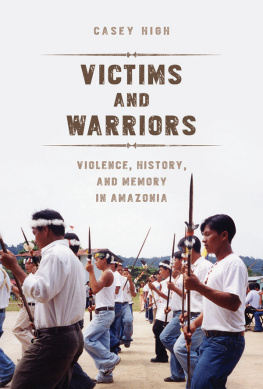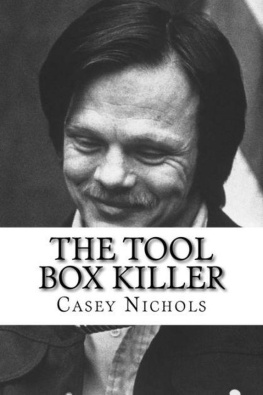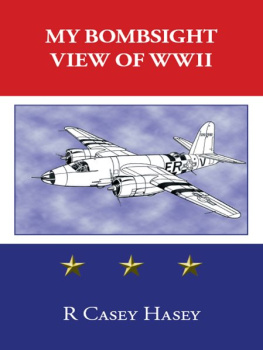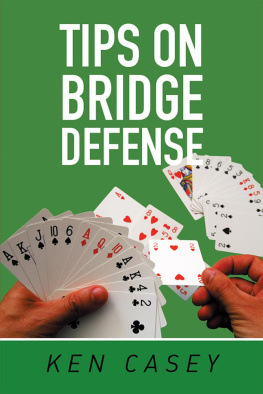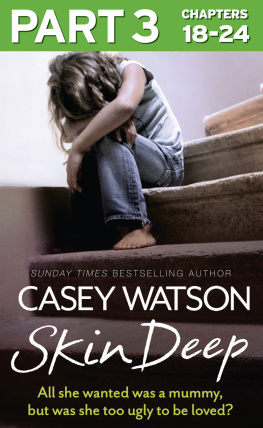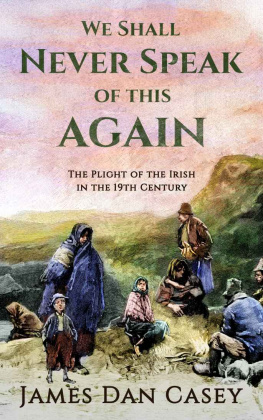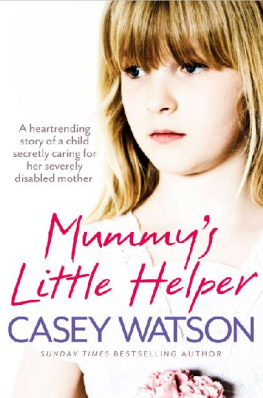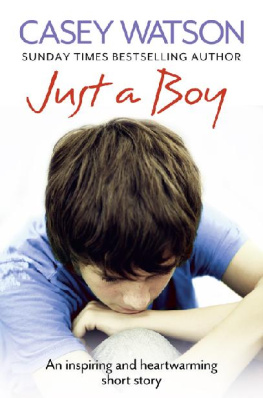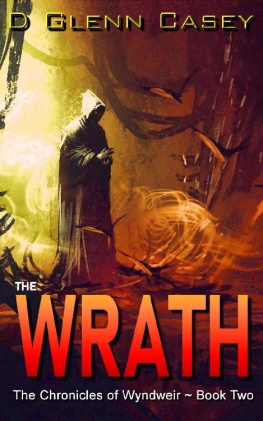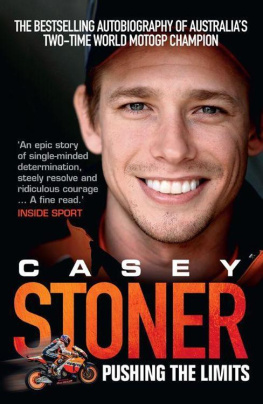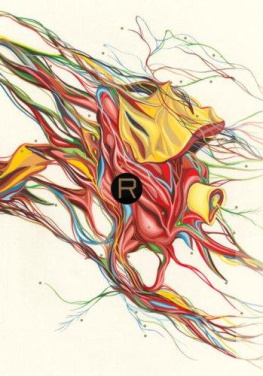2015 by the Board of Trustees of the University of Illinois
All rights reserved
Manufactured in the United States of America
1 2 3 4 5 C P 5 4 3 2 1
This book is printed on acid-free paper.
Library of Congress Cataloging-in-Publication Data
High, Casey, 1977
Victims and warriors: violence, history,
and memory in Amazonia / Casey High.
pages cm. (Interpretations of culture in the
new millennium)
Includes bibliographical references and index.
ISBN 978-0-252-03905-8 (cloth : alk. paper)
ISBN 978-0-252-08067-8 (pbk. : alk. paper)
ISBN 978-0-252-09702-7 (ebook)
1. Huao IndiansEcuadorEthnic identity.
2. Huao IndiansEcuadorSocial conditions.
3. Huao IndiansWars.
4. ViolenceEcuador.
5. Ethnic relationsEcuador.
I. Title.
F3722.1.H83H55 2015
305.8009866dc23 2014033693
For my parents, Fred and Sue, Amowa and aiAcknowledgments
This book was made possible by the kindness, support, and intellectual engagement of a seemingly endless list of people at different times and in very different places. First and foremost I would like to thank all of my Waorani friends and acquaintances, whom I occasionally refer to somewhat awkwardly in the following pages as my hosts. These are the kind and, above all, patient people in the villages of Toampari, Kiwado, and elsewhere who have opened their homes and lives to me over the years. The tolerance, humor, and care I encountered in these places made my fieldwork not only possible but also enjoyable. I especially thank Amowa and ai, my Waorani parents, for sharing their home with me during my fieldwork. Their friendship and generosity, and their many children, have given me abundantly fond and entertaining memories of my time in Toampari. This book also owes much to many other people whose conversations, concern for my well-being, and tolerance for my often ill-informed questions continue to make my research possible: Koba, Gakamo, Toka, Sarita, Timo, Ramona, Kemperi, Uboye, Ana, Manuela, Wareka, Jorge, Wira, Gemea, Apa, Paa, Alicia, Nanto, Moipa, Yato, Awanka, Iteka, Rosa, Jaime, Cesar, Gaia, Taremo, Abraham, Juan, and the late Dayuma.
I would also like to thank my friends at the Waorani political office in Puyo for supporting my fieldwork and for arranging my travel to Waorani villages. Special thanks to Manuela Ima, whose gift packages and radio communications from the city made the remote location of much of my fieldwork less daunting. In this book I reluctantly use pseudonyms to conceal the identities of most Waorani individuals because narratives of violence and othering appear in much of the writing. I hope this would not disappoint them too much.
The research upon which the book is based was funded by grants from the Wenner-Gren Foundation, the Fulbright Commission, the Economic and Social Research Council (ESRC), the Centre national de la recherche scientifique (CNRS), and the Central Research Fund of the University of London. I would like to thank all of these institutions for helping make my research possible.
In addition to the Waorani political office, I owe thanks to a number of institutions in Ecuador and elsewhere that have supported my research in various ways. The Honors College of Washington State University provided an undergraduate study-abroad scholarship and much encouragement for my first full year in Ecuador, where the Centro de Investigaciones del Medio Ambiente y Salud (CIMAS) in Quito supported my initial trip to Toampari. Thanks to Jose Juncosa, my subsequent fieldwork was sponsored in Ecuador by Editorial Abya-Yala. I thank also the schoolteachers in Toampari, especially Juan Carlos Armijos, who allowed me to participate in their classes and conversations. In Quito, linguist Connie Dickinson has provided valuable support in training me and several of my Waorani friends to film, transcribe, and translate video recordings. This work, which is part of a collaborative project to document the Waorani language, has helped me significantly in my analysis of Waorani narratives.
Many people have helped me rethink the ideas presented in this book by commenting on earlier drafts or being part of conversations that have contributed to the book. These include Magnus Course, Anne-Christine Taylor, Mary-Elizabeth Reeve, Laura Rival, Jason Sumich, Amit Desai, Girish Daswani, Maurice Bloch, the late Olivia Harris, Mette High, Eve Zucker, Maya Mayblin, Giovanni da Col, Liana Chua, Harry Walker, Ann Kelly, Marc Brightman, Vanessa Grotti, Marcelo Fiorini, and Stephen Nugent. Past and present colleagues at the London School of Economics, Goldsmiths, CNRS, and the University of Edinburgh have contributed a great deal to my thinking and writing through their comments and suggestions in seminar presentations. Throughout the process of writing this book, I have been particularly fortunate to have the enthusiastic support of the series editor, Norman Whitten. As both a leading scholar on Amazonian Ecuador and a committed editor, his critical comments, advice, and support have been invaluable. Special thanks are due to my former PhD supervisors, Peter Gow, Rita Astuti, and the late Olivia Harris, for their inspiration and guidance. All of these people have influenced my thinking about the Waorani and anthropology a great deal, even if my efforts fall short of the suggestions they have made for revising the pages that follow.
Above all, I thank my parents, Fred and Sue, who never cease to offer me faithful support in every way for even the most outlandish projects and paths I have taken up over the years.
appeared in 2013 as Lost and Found: Contesting Isolation and Cultivating Contact in Amazonian Ecuador. Hau: Journal of Ethnographic Theory 3, no. 3: 195221.
Introduction
In September 2005 I made a trip to Amazonian Ecuador to visit the Waorani village of Toampari. A few days after arriving, I joined my old friend Toka and his family on a fishing trip a few hours downriver from his village to visit his parents house. It was on the final night of my stay that several children in the house gathered around my friends elderly father, Awanka, listening to him tell stories. Awanka, who is known for his skill in storytelling, spoke about past times when many babies died as a result of witchcraft, leading to a cycle of revenge killings with which his own generation is associated today. He warned the children that they should be careful not to speak to a shaman at night when his body is inhabited by his adopted jaguar-spirit (mei). He said that if the children were even to joke with the jaguar-spirit as it speaks through the shamans voice, telling it to scare people, a jaguar might kill the people they named. Even after a shaman dies, explained Awanka, his or her orphaned jaguar-spirit continues to live and kill people out of sadness and anger for its adopted parent.
During my fieldwork, old people like Awanka often told me how their relatives and ancestors became victims of violence, be it from shamans, spear-killing raids, or the shotguns of outsiders. In this case, he was explicitly warning his grandchildren about their behavior in reference to violent conflicts that occurred in the past. It is stories like this one, and people like Awanka, that attracted my interest in the meanings past killings hold for the Waorani today and, more particularly, the multiple ways they evoke the past in their homes, during treks in the forest, and on visits to urban areas in Amazonian Ecuador.

